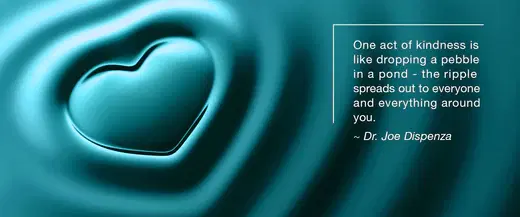The Reason Why Kindness Makes Us Happy
Dr Joe Dispenza | 27 May 2017
I believe a small group of people with compassion and kindness in their hearts can change the world, after all, that’s why we do the work we do. There’s a simple equation that says when you feel better, you treat other people better, and this produces a ripple effect that spreads out to everyone around you. One act of kindness is like dropping a pebble in a pond—the ripple spreads out to everyone and everything around you. The next thing you know, some lily pad in the far corner of the pond gets an uplifting shake and wiggle and it doesn’t know why.
While there is no doubt we are wired for self-preservation, contrary to this fact is the fact that we are also wired to be kind. Since the dawn of time, our human ancestors have evolved by helping each other out. We have evolved in groups and communities, which can be witnessed at the cellular level, to the cooperation between hunters and gatherers, all the way up to the formation of modern society. The way in which this aspect of evolution works is that cooperative groups and communities with the strongest bonds are more likely to survive long periods of time, so one of the ways you can create strong bonds in a group is to be kind and show compassionate behavior.
When you display kindness or compassion towards someone, the reason why you feel happy is that the bonding act produces a hormone called oxytocin. Oxytocin is well known for its role in childbirth and breastfeeding, as well as the role it plays in the early stages of intimate and loving relationships. That’s why these types of relationships create monogamy or bonding. It is oxytocin that produces elevated emotions that cause your heart to swell with love and joy (it’s been referred to as the chemical of emotional connection or the bonding hormone). When oxytocin levels are elevated above normal, most people experience intense feelings of love, forgiveness, compassion, joy, wholeness, and empathy—not an inner state you’d probably be willing to trade for something outside of you.
As oxytocin levels go up beyond a certain level, research shows that it’s difficult to hold a grudge. In one study conducted by scientists at the University of Zurich, 49 participants played a variation of what is known as the Trust Game 12 consecutive times. In this game, an investor with a certain amount of money must decide either to keep it or to share some of it with another player called the trustee. Whatever sum the investor shares with the trustee is automatically tripled. The trustee is then faced with the decision to keep all the money, leaving the investor with nothing, or to share the tripled sum with the investor, who is obviously hoping to make a profit. Basically, the either/or decision comes down to betrayal. While a selfish act is a win for the trustee, it leaves the investor at a loss.
But what if oxytocin is introduced into the equation? In the study, the researchers gave some players a squirt of oxytocin in their nose before the game, while others received a squirt of placebo. The researchers then took MRI scans of the investors’ brains as they made their decisions regarding the amount to invest and whether or not to trust.
After the first six rounds, the investors were given feedback on their investments and were notified that their trust had been betrayed about half of the time. The participants who received the placebo before playing the game felt angry and betrayed, and so they invested much less in the closing six rounds. The participants who received a squirt of oxytocin, however, invested the same amount as they had in the first rounds, despite having been betrayed. fMRI (functional magnetic resonance imaging) scans showed the key areas of the brain affected were the amygdala (associated with fear, anxiety, stress, and aggression) and the dorsal striatum (which guides future behaviors based on positive feedback). Participants who received the oxytocin had much lower activity in the amygdala, equating to less anger and fear of being betrayed again, as well as less fear of financial loss. They also had much lower activity in the dorsal striatum, meaning they no longer needed to rely on positive results to make future decisions.
As this study demonstrates, the moment oxytocin levels go up, this shuts down the survival centers in the brain’s amygdala, meaning it cools off the circuits for fear, sadness, pain, anxiety, aggression, and anger. Then the only thing we feel is a love for life (that’s because the amygdala is wired for four basic emotions: fear/anxiety, sadness/pain, anger/ aggression, and love/joy). We’ve measured the levels of oxytocin in many of our students before and after our workshops. At the conclusion of the event, some of them had elevated their levels significantly. When we interviewed those students, many of them kept saying, “I’m just so in love with my life and everyone in it. I never want this feeling to go away. I want to remember this feeling forever. This is who I really am.”
Nature selects the genes that predispose us to want to connect with each other. That’s why we live in groups, so here’s a simple idea to boost your oxytocin levels, and thus your happiness. For the next month or two, choose one day a week to practice five acts of kindness. It doesn’t have to be anything big either—it can be as simple as making some time for someone, demonstrating gratitude, holding the elevator, or helping someone carry their groceries. At the duration, see if you feel any different.
We often think of side effects as negative, but kindness actually has some good side effects. Simply put, kindness makes us happier, and who doesn’t want more happiness?

Comments